Munich Shortfall
I’m not trying to be a hard-ass for the sake of being a hard-ass, but I can’t get on the Oscar boat for Steven Spielberg’s Munich (Universal, 12.23).
It’s a pretty good movie, but the Best Picture hoo-hah seems a tiny bit forced given what this film truly is in the light of day. If you ask me those prognosticators who’ve already said “this is it!” are conning themselves.
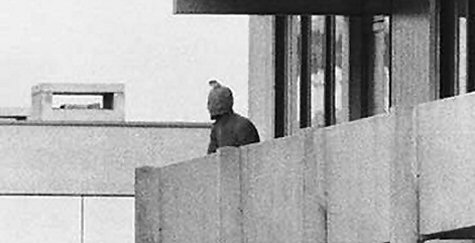
One of the Black September hostage-takers during the actual 1972 Munich Olympic Games standoff
Directed by Spielberg and written (for the most part) by Tony Kushner and Eric Roth, Munich is a longish (160 minutes), thoughtful drama about Israel’s revenge campaign against the perpetrators of the 1972 Munich Olympic Games killings of Israeli atheletes. It’s strong, meaningful and well-intended…but I don’t get all the jumping up and down.
I’m talking about the proclamations about it being the new Best Picture front-run- ner. It’s in the running, I guess, but it sure as shit is no shoo-in.
< ?php include ('/home/hollyw9/public_html/wired'); ?>
I spoke last night to a guy who’ll be voting this Saturday with the L.A. Film Critics, and we had both just seen Munich and were talking about the Best Picture Oscar contest, and he said, “I don’t know if [Munich] will even get nominated.”
He may have been overly dismissive, okay, but any seasoned film guy making such a statement should give you a hint about what’s going on here.
I felt the euphoric current at the DGA theatre last year after seeing Million Dollar Baby — I was levitating — but nothing like this kicked in last night inside theatre #5 at the AMC Century City.
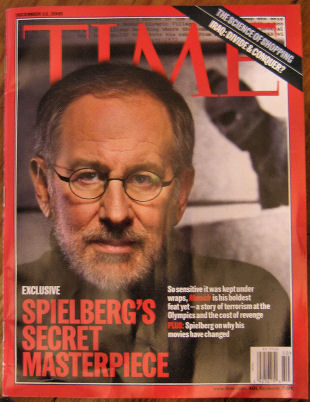
Munich wants first and foremost to say something earnest about the legacy of political killing. It’s a movie that doesn’t quite cry out for peace, but is clearly asking for it. It connects here and there in short bursts, but it mainly achieves a general mezzo-mezzo effect of “okay, good point, we get it.”
Which is why I don’t get the effusive praise from Time‘s Richard Schickel and Fox 411’s Roger Friedman and what I presume will be an oncoming tide of kiss-assers …the Spielberg kowtow brigade looking to show obeisance before power.
David Poland was more measured in his “Hot Button” reaction on Monday night, but he still believes from a hard-nosed realpolitik standpoint that Munich is the presumptive Best Picture winner, and that’s just wrong. Perhaps not inaccurate, but dead fucking “wrong” because Best Picture Oscars shouldn’t go to good movies that say the right thing, etc. but don’t inspire major passion.
Really exceptional movies always get people deep down in one way or another. They provoke, excite…make you choke up. They almost always deliver some kind of intrigue that usually builds and gains upon reflection. But I was not so moved last night.
I didn’t conduct a poll in theatre #5 but I could “feel the room” as the film unspooled and I’d be surprised if Munich aroused any go-for-broke fervor. But I’ll bet every last critic who saw it last night, if you were to pop the question, would say it’s a “good film” or “very strong” or “important.”
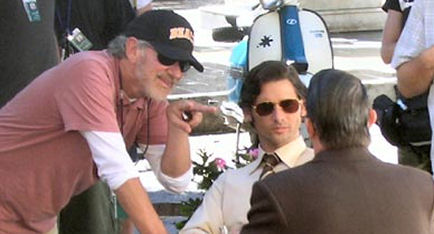
Steven Spielberg conferring with Eric Bana (shades) during last summer’s shooting of Munich
And it is that. Munich is a smart and stirring ride. It’s still with me this morning, still pinging around in my rib cage…and yes, I respect where it’s coming from and how Spielberg has organized the journey, for the most part.
And yes, of course, I agree with and support what Munich is saying about the rotten karma that comes out of any act of murder.
Munich is saying that however well justified or rationalized those revenge killings may have been, the air was still befouled and the spiritual effects upon three of the Mossad team — sensitive Israeli assassins played by Eric Bana, Mathieu Kosso- vitz and Ciaran Hinds — were disturbing and unsettling.
(Honestly? I felt almost relieved that two other guys on the team — Daniel Craig’s character and some older guy — don’t seem to pay the price as much. I don’t know why exactly, but I was vaguely comforted by these two being hardcore enough to just do the friggin’ job sans guilt trips.)
As a man with two sons, as a film critic, as a movie fiend…I side with any movie that says “killing is bad” or “killing others…even those who may deserve to die …will let loose a virus in your soul.”
But Munich rarely rises above the level of being dutiful, thoughtful and morally correct. All it is, really, is a sprawling here-and-there procedural with a gathering sense of moral disquiet. That’s a fine and respectable thing, but it doesn’t exactly set off tremors or firecrackers.
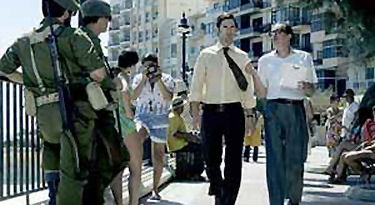
Eric Bana, Geoffrey Rush
Michael Lonsdale (whose performance as the investigator in Fred Zinneman’s The Day of the Jackal is one of my all-time favorites) is the best element in Munich. I also quite enjoyed the performance by Mathieu Almaric (last seen in Kings and Queen) as Lonsdale’s churlish son.
There is hoopla over Munich because it’s on the cover of this week’s Time and because the Best Picture situation is very much in flux and everyone’s looking for another Million Dollar Baby to sweep them off their feet.
I can sense a psychological eagerness to consider an end-of-the-year Spielberg movie about the ethical costs and karma of revenge…about the quandaries facing Jews and anti-Zionists in the Middle East as their conflict persists. Journos are primed because it’s that time of year and this is Spielberg-getting-all-morally- earnest-in-December and because everyone’s been saying “Munich is coming, Munich is coming” since last spring.
And everyone wants to savor Spielberg’s second big-statement movie about what good people have done when Jews have been killed because they’re Jews…killed by haters, racists, Nazis, anti-Zionists.
Oskar Schindler did what he did in Schindler’s List and became known to the audi- ence (as he had to his biographers) as a good, compassionate, peculiar, complex man. And the Mossad team led by Eric Bana are reasonably decent guys who go out and do what they do, and the virus of murder and retribution gets into their hearts and systems and they begin to pay the price.
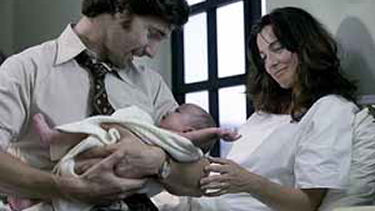
And poor Eric Bana’s character gets the worst of it because he finds it hard to concentrate on making love to his lusciously sexy wife in their Brooklyn apartment because he can’t get those images and sounds of the massacre at the Munich airport in ’72 out of his head…images and sounds he absorbed from TV coverage because he wasn’t there.
I’m not trying to be a smart-ass, but this bizarre sex scene reminded me a tiny bit of Woody Allen’s Alvy Singer not making love to Carol Kane in Annie Hall because he can’t stop talking about the Kennedy assassination and the Warren Report.
Is Munich profound? Is there anything earth-shaking here? In what way does this film step out and grab you by the shirt collar and say, “Wake up!” In what way does it rock anyone’s world in terms of technique, even?
Okay, it feels in some ways like a ’70s film…but that’s not making me shudder or leap out of my seat as I acknowledge this.
The most riveting portions, as you might expect, are about how the killings of the members and supporters of the Munich operation (the core group was known as “Black September”) are carried out, and what goes wrong. The strongest happen early on — a killing in Rome and then another in Paris, which involves a family man and his daughter.
There’s a particularly effective portion involving a pretty woman at a London hotel who gets briefly involved with Bana and Hinds, and a killing results, and then another killing. I don’t want to spoil but the whole cause-and-effect sequence is both sad and shocking.

Tony Kushner’s script gives each Doubting Thomas character a speech just as he starts crumbling, or just before fate is about to take a hand. There’s a certain wordy literalness going on here that isn’t quite as effective as Spielberg and Kushner would like it to be.
Munich ends in New York City with a long shot of a certain downtown landmark. A friend feels this shot was overdoing things a bit, but at least Spielberg doesn’t go in for a closeup, and the CG image is quite realisitic and haunting.
I have gotten to the point where Janusz Kaminski’s cinematography is starting to blatantly turn me off. He has become the one dp whose work really and truly irri- tates me.
Every film Kaminski has shot for Spielberg — War of the Worlds, The Terminal, Catch Me If You Can, Minority Report, A.I., Saving Private Ryan, Amistad and now Munich — has looked more or less the same to me, regardless of the theme or mood. I’m referring to the Kaminski palette of slightly desaturated color, a slightly misty soft-focus look, starchy white light flooding through windows during daytime scenes, a lack of sharpness, and a bizarre fondness for grain.
I think that calling this film Munich was a little bit of a chickenshit move. It should have simply been called Vengeance . I realize that the “Vengeance” book it’s partly based upon has blemishes against it, but vengeance is what this movie is primarily about, and Spielberg should have just copped to that.
Next Year’s Balloon
Here are some initial calls about next year’s Ocar contenders. I’d like to hear from anyone who’s read the scripts or can pass along versions of the scripts to yours truly…whatever. I just think it’s time to start looking ahead and planning ahead, etc.
Thanks to Canadian correspondent and rabid script-hound Jean-Francois Allaire for starting me on this jag…
Best Picture: The Departed (Warner Brothers); Babel (Paramount); The Good Shepherd (Universal Pictures); Southland Tales (Universal); Marie Antoinette (Columbia Pictures); The Pursuit of Happyness (Columbia Pictures); Breaking and Entering (The Weinstein Co.); All The King’s Men (Columbia Pictures); A Good Year (20th Century Fox); Stranger Than Fiction (Columbia).
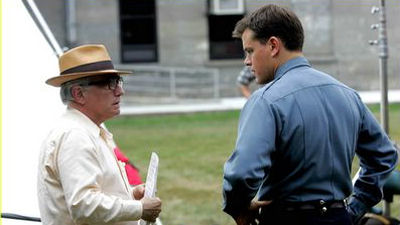
Martin Scorsese, Matt Damon on the set of The Departed
Best Director: Steve Zaillan (All The King’s Men); Anthony Minghella (Breaking and Entering); Martin Scorsese (The Departed); Steven Soderbergh (The Good German); Ridley Scott (A Good Year); Alejandro Gonzalez Inarritu (Babel); Marc Forster (Stranger Than Fiction); Richard Kelly (Southland Tales).
Best Actor: Will Smith (The Pursuit of Happyness); Matt Damon (The Good Shepherd); Jude Law (Breaking and Entering); Sean Penn (All The King’s Men); Brad Pitt (Babel).
Best Actress: Cate Blanchett (The Good German or Babel ); Maggie Gyllenhaal (Stranger Than Fiction)….need more!
Best Supporrting Actor: Jack Nicholson (The Departed); Hugh Grant (American Dreamz); Gael Garcia Bernal (Babel); Albert Finney (A Good Year); Jamie Foxx (Dreamgirls)
Best Supporting Actress: Zip…anyone?
Best Original Screenplay: Richard Kelly (Southland Tales); Paul Weitz (American Dreamz); Eric Roth (The Good Shepherd); Anthony Minghella (Breaking and Entering).
Best Adapted Screenplay : Sofia Coppola (Marie Antoinette).
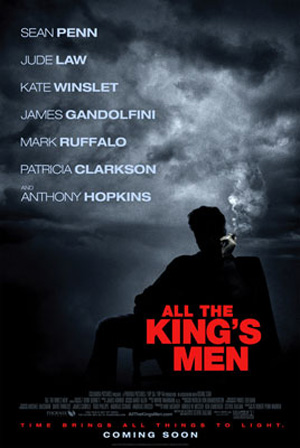
Rundown
The first high-profile award announcements will come this Saturday afternoon from the Los Angeles Film Critics, with the final calls starting to leak out sometime around 1 pm or 2 pm.
The National Board of Review — that odd-smelling, Manhattan-based, awards- dispensing group made up of mostly weirdos and wackos (with the noteworthy exception of respected Columbia film professor and scholar Annette Insdorf) would have been first — i.e., today — but the group has delayed their announcements until next Monday, 12.12, due to some omissions on their initially mailed-out ballot.

On the same day the New York Film Critics Circle will announce their picks (expected a final decision around 1 pm Eastern), and since the NYFCC is roughly eight or nine times more respected than the National Board of Review (or is that eighty or ninety times?), the likelihood is that reporters and Oscar assesors will pay even less attention to the NBR winners than usual.
The very next day (Tuesday, 12.13) the Golden Globe nominations will be announced. These noms will be a very big moment for Diane Keaton and The Family Stone…I hope, I hope. And let’s hope that Terrence Howard (Hustle & Flow), bless him, hangs in there as a Best Actor in a Drama nominee.
I don’t have the dates for all the other critics groups but many of them will start to weigh in next week also, or very soon after. Critics groups from Boston, San Francisco, Chicago, Miami, San Diego, Seattle, etc.
Then it’s Christmas and New Year’s and the annual depression and suicide surge that happens ever year, and then…well, here’s the schedule:

* Writers Guild of America and Producers Guild nominations: Wednesday, 1.4.06
* Screen Actors Guild and Directors Guild nominations: Thursday, 1.5.06.
* BFCA Awards: Monday, 1.9.06
* Golden Globe Awards: Monday, 1.16.06
* Directors Guild Awards: Saturday, 1.28.06
* Screen Actors Guild awards: Sunday, 1.29.06
* Academy Award nominations: Tuesday, 1.31.06
* Writers Guild Awards: Saturday, 2.4.06
* BAFTA Awards: Sunday, 2.19.06
* Independent Spirit Awards: Saturday, 3.4.06
* Academy Awards telecast: Sunday, 3.5.06
* Rest Period: March through late June-slash-early July ’06
* Campaigning Strategizing for 2006 Awards (i.e., 2007 Academy Awards) commences and long-term expectations begin to come into focus: Early to Mid-July 2006.

Rumble in the Jungle
I saw King Kong for the second time Monday morning (12.5), and I feel the same way I did after my first viewing Sunday night. About 110 minutes of this three-hour film (i.e., the last two-thirds) are rock ‘n’ roll and worth double the ticket price. And the finale is genuinely touching.
After Sunday night’s screening at the Academy theatre I called the better parts of this monkey movie “damned exciting in an emotional, giddily absurd, logic-free adrenalized way.”
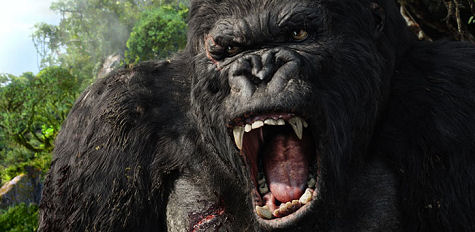
And then I offered a limited apology to its creator, Peter Jackson. “You aren’t that bad, bro,” I said. “You got a few things right this time. The movie is going to lift audiences out of their seats. And I need to say ‘I’m sorry’ for bashing you so much because you’ve almost whacked the ball out of the park this time.”
Almost, I say.
King Kong is too lumpy and draggy during the first hour or so to be called exquisite or masterful, but there’s no denying that it wails from the 70-minute mark until the big weepy finale at the three-hour mark. Monkey die, everybody cry.
The emotional support comes from the current between Kong and Naomi Watts, who is pretty much the soul of the film. I was concerned that the tender eye-rap- port between them would be too much, but it isn’t. It’s relatively restrained and subtle and full of feeling.
And Andy Serkis’ Kong performance doesn’t play like any kind of “Gollum Kong” (which I fretted about a year and a half ago in this space), and in fact he creates something surprisingly life-like, or do I mean ape-like?
The good ship Kong starts out with a spirited montage (scored with a classic Al Jolson tune called “I’m Sittin’ On Top of the World”) that shows what Depression- era 1933 New York City probably looked and felt like on the streets. The recrea- tions of this bygone Manhattan are awesome, immaculate…CGI illusion at its most profound.
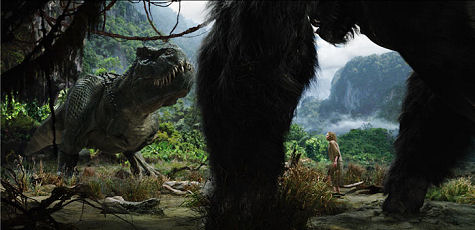
So the first ten or so minutes are fine, but then things start to get lunky and pokey and meandering, and the dialogue becomes increasingly stiff and speechy, and before you know it Kong is close to crashing on the rocks and suffering a gash in the hull.
It’s very touch-and-go from roughly the 10 to the 65- or 70-minute mark. I was shifting in my seat and going “uh-oh.” But things take off once Kong snatches Watts, and the energy stays high and mighty from there to the finale.
You can break Kong down into three sections…
(a) The draggy 70-minute first act, which is all New York set-up, character exposi- tion, the long sea voyage to Skull Island, tedious philosophizing and no action to speak of;
(b) the breathtaking, nearly 70-minute Skull Island rumble-in-the-jungle section, including the breathtaking dino-run sequence (an absolute instant classic that’s likely to drive most of the repeat business in and of itself), Kong vs. the T-Rex trio, and the icky spider-and-insect pit sequence;
(c) the 42 or 43-minute New York finale with Kong on-stage, breaking the chrome- steel chains and escaping, trashing Manhattan, finding Watts, and facing planes and fate atop the Empire State building.
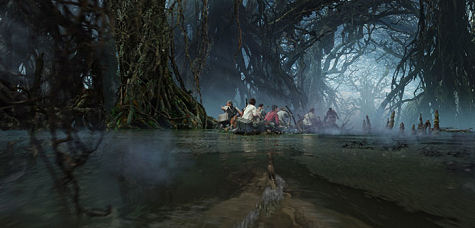
If I were a 14 year-old kid talking to friends about all of us seeing Kong a second or third time, I would suggest that everyone try to slip into the theatre after the first hour because who wants to sit through all that talky crap again?
Kong isn’t better than Jackson’s Heavenly Creatures because it’s almost entirely about enthusiasm and has almost nothing to do with restraint (bad word!), but it’s still the most thoroughly pulse-pumping, rousingly kick-ass film Jackson’s ever delivered, and respect needs to be paid.
And I mean especially by someone who’s been bashing the pud out of Jackson for the last four years or so, calling him an indulgent (and overly indulged), excessive, paint-splattering “wheeeeee!” director all this time.
Make no mistake — Kong shows Jackson is still all of these things. But Kong is a movie with a big heart and a stupidly exuberant joie de cinema coarsing through its veins…during the second and third acts, I mean.
And even though Jackson has gone way beyond the point where he’s able to show minimal respect for physics and could-this-happen? issues of logic and probability …a point from which he’ll never return…he manages such amazing visual feats and surges once the film takes off that all objections are moot. Even if some of the action scenes are cartoonishly wham-bam and ridiculous.
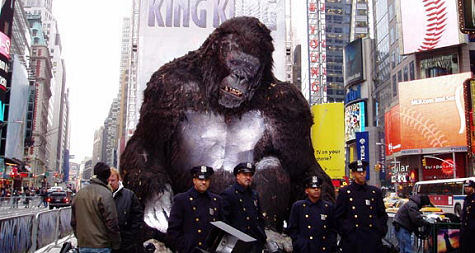
Life-size Kong model currently sitting in Manthatan’s Times Square
I’ll get into this a bit more later in the week, but I felt I had to cop to the fact that Jackson has hit one deep into center-left field.
Jack Black’s Carl Denham isn’t at all bad (he’s mouthy and slimy, but he doesn’t reach for outright comedy), Adrien Brody inhabits the playwright-hero to sensitive perfection, and Kong’s snaggle tooth is glimpsed only a few times and a non-issue.
Sometime next week I’m going to run a list of things in King Kong that make little or no sense (and it’s a long list), but right now it’s simply time to acknowledge that the parts of the film that get your blood racing and your emotions worked up work really well.
[Incidentally: I wrote last night that King Kong starts with an overture taken from Max Steiner’s original score for the 1933 film. However, I learned today [Monday] that Steiner’s overture was played before the presentation of Jackson’s film as a mood-setter by the people in the projection department at the Academy of Motion Picture Arts and Sciences theatre, so it isn’t attached to the film and won’t be heard by regular audiences. That’s a shame.]
Remember This













